เทียบหมัดต่อหมัด
RISE พหลฯ-อินทามระ
vs
LPN Selected สุทธิสาร-สะพานควาย
ภารกิจแรกของนักสืบอสังหา คือการสืบเสาะเจาะลึก 2 คอนโดใหม่ ที่มายึดพื้นที่เส้นถนนสุทธิสาร ตัดผ่านพหลโยธิน (สะพานควาย)ไปยังวิภาวดีรังสิต คนโซนนี้จะรู้ดีว่า นี่คือโซน “อินทามระ ” ที่แต่เดิม ไม่ได้มีเจ้าใหญ่ๆมาสร้างคอนโดตึกสูงมาก่อน…แต่การมาทั้งที ก็ไม่มาแบบเรียบๆ เพราะ 2 เจ้าคอนโด พร้อมชนกันทั้งราคาและจำนวนยูนิต แบบไม่ทิ้งห่างกันเท่าไร และวันเปิดจองพร้อมกัน 28 เม.ย. 61 ที่ผ่านมา จึงเป็นจุดสนใจให้เรามาสืบหาคำตอบว่า คอนโดโซนนี้ ไปรอดจริงมั้ย ? และเจ้าไหนมาเหนือกว่า?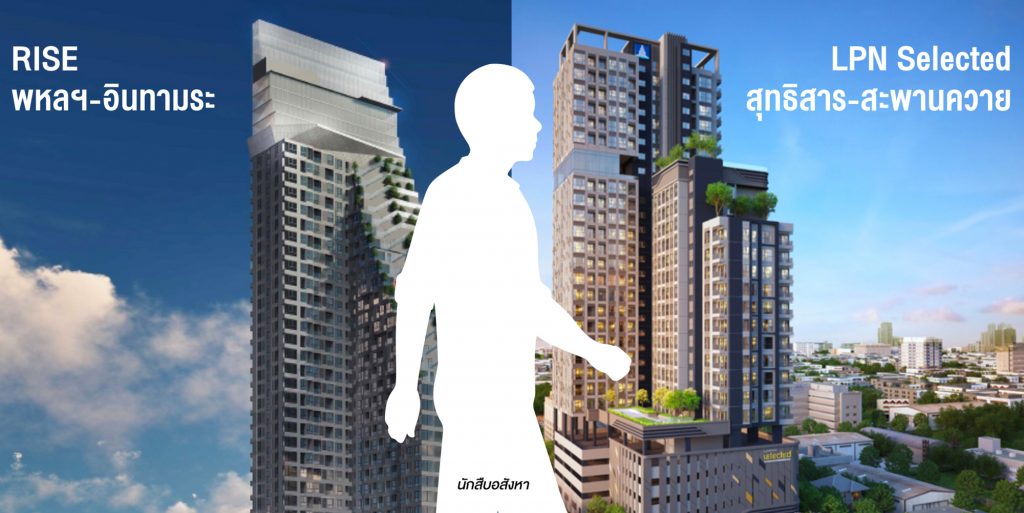 ฝ่ายแดง RISE พหลฯ-อินทามาระ โดย All Inspire (น้องใหม่ของวงการ)
ฝ่ายแดง RISE พหลฯ-อินทามาระ โดย All Inspire (น้องใหม่ของวงการ)
ฝ่ายน้ำเงิน LPN Selected สุทธิสาร-สะพานควาย โดย LPN (พี่ใหญ่ชุมชนน่าอยู่)
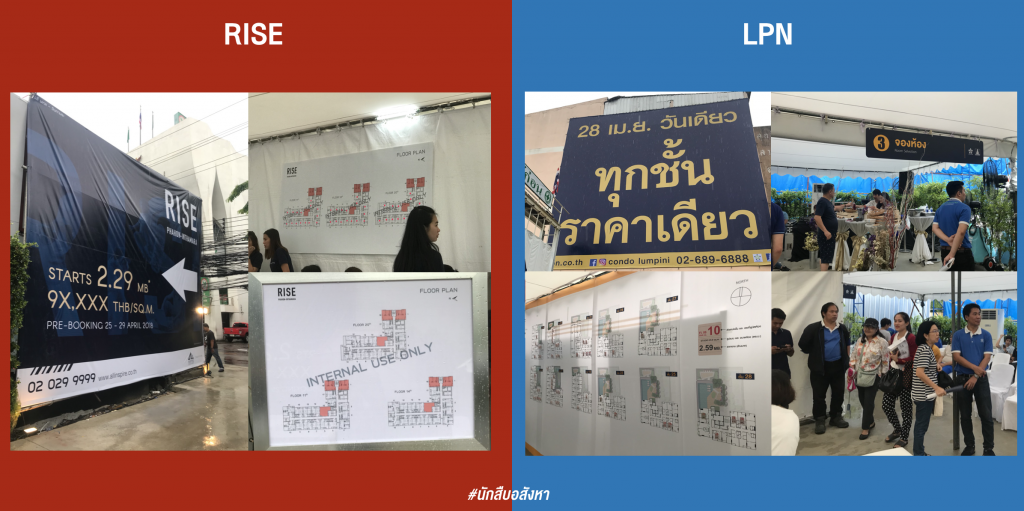
วิเคราะห์เทียบหมัดต่อหมัด โดย “นักสืบอสังหา”
Location : ไม่ได้มีความแตกต่างกันมากนักเพราะอยู่ใกล้กัน ห่างเพียง 70 เมตร
พิกัด RISE (คลิก) พิกัดLPN (คลิก) Developer : ความน่าเชื่อของ LPN มีมากกว่า All Inspire เพราะชื่อเสียงที่สร้างมานานของ LPN โดยเฉพาะเรื่อง ชุมชนน่าอยู่ ซึ่งต่างจาก All Inspire ที่เพิ่งเข้ามาวงการนี้ได้ไม่นาน (แต่ก็ถือว่าเป็นน้องใหม่ไฟแรงที่มาแรงเหมือนกัน)
Developer : ความน่าเชื่อของ LPN มีมากกว่า All Inspire เพราะชื่อเสียงที่สร้างมานานของ LPN โดยเฉพาะเรื่อง ชุมชนน่าอยู่ ซึ่งต่างจาก All Inspire ที่เพิ่งเข้ามาวงการนี้ได้ไม่นาน (แต่ก็ถือว่าเป็นน้องใหม่ไฟแรงที่มาแรงเหมือนกัน) พื้นที่โครงการ : พื้นที่โครงการน่าจะใกล้เคียงกัน ซึ่งหากมีข้อมูลอัพเดตของ All Inspire อัพเดตอีกครั้ง
พื้นที่โครงการ : พื้นที่โครงการน่าจะใกล้เคียงกัน ซึ่งหากมีข้อมูลอัพเดตของ All Inspire อัพเดตอีกครั้ง จำนวนยูนิต : จำนวนยูนิตรวมใกล้เคียงกัน ก็ถือว่าไม่ได้เยอะมาก แต่ความ Private ของ Rise มีความเป็นส่วนตัวกว่าเพราะยูนิต/ชั้นน้อยกว่า
จำนวนยูนิต : จำนวนยูนิตรวมใกล้เคียงกัน ก็ถือว่าไม่ได้เยอะมาก แต่ความ Private ของ Rise มีความเป็นส่วนตัวกว่าเพราะยูนิต/ชั้นน้อยกว่า รูปแบบ/ขนาดห้องชุด : ต้องบอกเลยว่าคู่นี้เค้าจัดวางขนาดห้องออกมาชนกันแบบตรงตัวทั้งขนาดห้องเล็กสุด (25 ตร.ม.) และห้องที่เป็น Mode ของโครงการ (31 ตร.ม.) ต้องมาดูกันว่า Function ห้องแบบไหนที่โดนใจลูกค้า
รูปแบบ/ขนาดห้องชุด : ต้องบอกเลยว่าคู่นี้เค้าจัดวางขนาดห้องออกมาชนกันแบบตรงตัวทั้งขนาดห้องเล็กสุด (25 ตร.ม.) และห้องที่เป็น Mode ของโครงการ (31 ตร.ม.) ต้องมาดูกันว่า Function ห้องแบบไหนที่โดนใจลูกค้า  Plan Studio : เทียบ Function ห้อง Studio แล้ว Rise รูปแบบ Function น่าจะถูกใจลูกค้ามากกว่า เนื่องจากเป็น Plan หน้ากว้าง และมีการแบ่งฟังก์ชั่นห้องชัดเจนมากกว่าของ LPN และรูปแบบครัวเป็นแบบปิด ซึ่งตอบโจทย์คนทำงานที่ชอบทำครัว แต่ไม่ชอบกลิ่นเข้าห้อง
Plan Studio : เทียบ Function ห้อง Studio แล้ว Rise รูปแบบ Function น่าจะถูกใจลูกค้ามากกว่า เนื่องจากเป็น Plan หน้ากว้าง และมีการแบ่งฟังก์ชั่นห้องชัดเจนมากกว่าของ LPN และรูปแบบครัวเป็นแบบปิด ซึ่งตอบโจทย์คนทำงานที่ชอบทำครัว แต่ไม่ชอบกลิ่นเข้าห้อง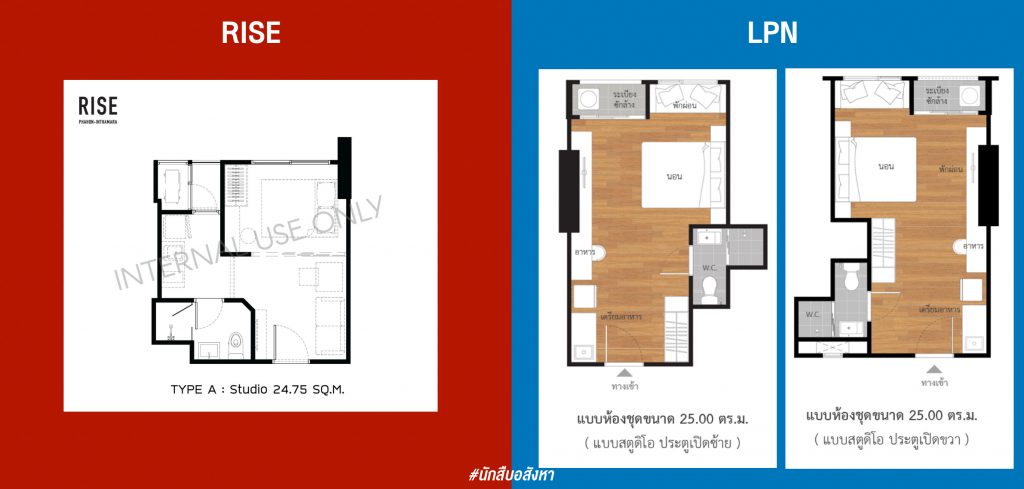 Plan 1 Bed : ต้องบอกเลยว่าทั้ง 2 ค่ายนี้พยายาม Design รูปแบบ Function ห้องให้ออกมาเป็น Plan ฟังก์ชั่นใหม่ โดยของ LPN ต้องการตอบโจทย์ลูกค้าผู้หญิง จึงปรับ Function ห้องนั่งเล่นให้เป็น Walk in Closet สำหรับแต่งตัว นั่งเล่นอยู่ในห้องนอน ครัวแบบเปิด นั่งทานข้าวในห้องนอน ส่วนของ Rise เองพยายาม Design ครัวแบบปิดและอยู่ด้านหน้าทางเข้า และนำพื้นที่ Living เข้าไปอยู่ในห้องนอน จุดขายระเบียงในห้องนอนหรือห้องนั่งเล่นเท่านั้น ความเห็นส่วนตัวมองว่า ทั้ง 2 ค่ายทำ Plan ออกมาไม่ค่อยตอบโจทย์ลูกค้าครบถ้วนเท่าไหร่ มีเพียงบาง Function เท่านั้นที่ตอบโจทย์ ต้องรอดู Feedback ต่อไป ตอนห้องตัวอย่างของ Rise เสร็จว่าจะจัดออกมาได้ดึงดูดใจหรือไม่
Plan 1 Bed : ต้องบอกเลยว่าทั้ง 2 ค่ายนี้พยายาม Design รูปแบบ Function ห้องให้ออกมาเป็น Plan ฟังก์ชั่นใหม่ โดยของ LPN ต้องการตอบโจทย์ลูกค้าผู้หญิง จึงปรับ Function ห้องนั่งเล่นให้เป็น Walk in Closet สำหรับแต่งตัว นั่งเล่นอยู่ในห้องนอน ครัวแบบเปิด นั่งทานข้าวในห้องนอน ส่วนของ Rise เองพยายาม Design ครัวแบบปิดและอยู่ด้านหน้าทางเข้า และนำพื้นที่ Living เข้าไปอยู่ในห้องนอน จุดขายระเบียงในห้องนอนหรือห้องนั่งเล่นเท่านั้น ความเห็นส่วนตัวมองว่า ทั้ง 2 ค่ายทำ Plan ออกมาไม่ค่อยตอบโจทย์ลูกค้าครบถ้วนเท่าไหร่ มีเพียงบาง Function เท่านั้นที่ตอบโจทย์ ต้องรอดู Feedback ต่อไป ตอนห้องตัวอย่างของ Rise เสร็จว่าจะจัดออกมาได้ดึงดูดใจหรือไม่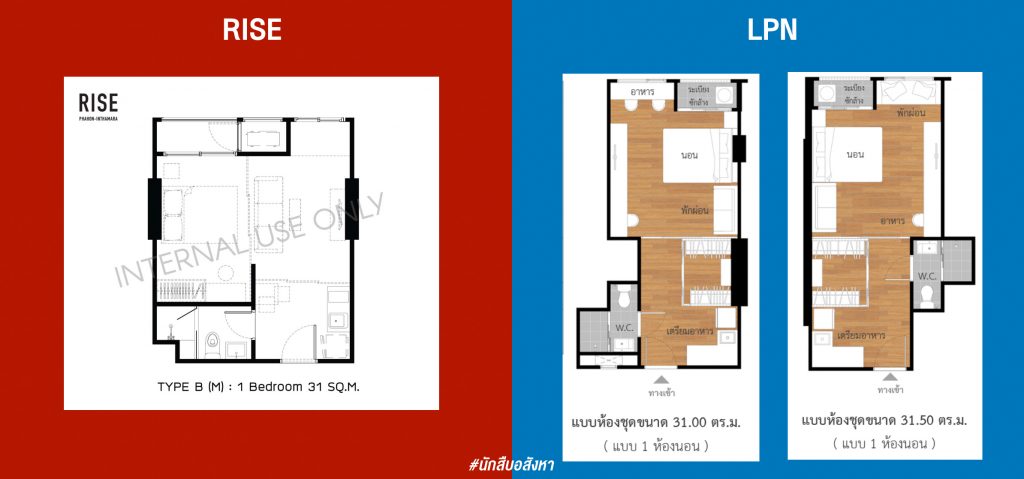 Floor To Ceiling : Rise สูงกว่า LPN แต่หากความเห็นส่วนตัวแล้วไม่ได้ต่างกันเยอะ เพราะเดี๋ยวนี้เค้าทำกัน 2.7 m. ถึงจะดูว๊าว
Floor To Ceiling : Rise สูงกว่า LPN แต่หากความเห็นส่วนตัวแล้วไม่ได้ต่างกันเยอะ เพราะเดี๋ยวนี้เค้าทำกัน 2.7 m. ถึงจะดูว๊าว ราคา : ราคาของ Rise ตอนเปิดตัวถูกกว่า LPN แต่เมื่อ LPNมีการปรับราคาเป็น One Price ต้องบอกเลยว่า LPN คือดูน่าสนใจเลยทีเดียว ตอนที่ LPN ยังไม่ได้ปรับราคาต้องบอกเลยว่าเป็นห่วงกับราคามาก และดูแนวโน้มแล้วทาง Rise ได้เปรียบเรื่องราคาที่จูงใจ แต่พอ LPN ปรับราคามา ทำให้ลูกค้าเริ่มลังเลใจเพราะอะไรหรอ เพราะว่าราคาใกล้เคียงกันแล้วนะสิ คราวนี้ต้องรอดูว่า Rise จะแก้เกมส์ต่อไปยังไงในรอบเปิดจอง VVIP วันที่ 2-3 มิ.ย.61
ราคา : ราคาของ Rise ตอนเปิดตัวถูกกว่า LPN แต่เมื่อ LPNมีการปรับราคาเป็น One Price ต้องบอกเลยว่า LPN คือดูน่าสนใจเลยทีเดียว ตอนที่ LPN ยังไม่ได้ปรับราคาต้องบอกเลยว่าเป็นห่วงกับราคามาก และดูแนวโน้มแล้วทาง Rise ได้เปรียบเรื่องราคาที่จูงใจ แต่พอ LPN ปรับราคามา ทำให้ลูกค้าเริ่มลังเลใจเพราะอะไรหรอ เพราะว่าราคาใกล้เคียงกันแล้วนะสิ คราวนี้ต้องรอดูว่า Rise จะแก้เกมส์ต่อไปยังไงในรอบเปิดจอง VVIP วันที่ 2-3 มิ.ย.61 โปรโมชั่น : ต้องบอกว่างานนี้ LPN ทุ่มโปรโมชั่นไม่อั้นให้แบบที่ไม่เคยให้มาก่อน ส่วนของ Rise ก็ตามราคาเนอะถูกกว่าแต่ก็ไม่ครบ
โปรโมชั่น : ต้องบอกว่างานนี้ LPN ทุ่มโปรโมชั่นไม่อั้นให้แบบที่ไม่เคยให้มาก่อน ส่วนของ Rise ก็ตามราคาเนอะถูกกว่าแต่ก็ไม่ครบ ผ่อนดาวน์ : LPN ผ่อนดาวน์ถูกกว่าและโครงการเสร็จเร็วกว่าของ Rise ซึ่งต้องบอกว่า LPN เรื่องงานก่อสร้างสร้างรวดเร็วกว่า ส่วนของ Rise เป็นน้องใหม่และเพิ่งทำตึกสูงเป็นตึกแรกต้องรอติดตามกันอีกที
ผ่อนดาวน์ : LPN ผ่อนดาวน์ถูกกว่าและโครงการเสร็จเร็วกว่าของ Rise ซึ่งต้องบอกว่า LPN เรื่องงานก่อสร้างสร้างรวดเร็วกว่า ส่วนของ Rise เป็นน้องใหม่และเพิ่งทำตึกสูงเป็นตึกแรกต้องรอติดตามกันอีกที กำหนดสร้างและเสร็จ : LPN เริ่มสร้างเร็วกว่า Rise เพราะ EIA น่าจะ Approved แล้วส่วนของ Rise กำลังรอพิจารณาอยู่
กำหนดสร้างและเสร็จ : LPN เริ่มสร้างเร็วกว่า Rise เพราะ EIA น่าจะ Approved แล้วส่วนของ Rise กำลังรอพิจารณาอยู่ ที่จอดรถ : น่าสนใจที่ Rise ให้ที่จอดรถมากกว่า LPN แถมเป็นแบบ Auto Parking อีกต่างหาก ถ้าให้คะแนนภาพรวมอันนี้คงมากสุด
ที่จอดรถ : น่าสนใจที่ Rise ให้ที่จอดรถมากกว่า LPN แถมเป็นแบบ Auto Parking อีกต่างหาก ถ้าให้คะแนนภาพรวมอันนี้คงมากสุด ชั้นที่เปิดจองวันที่ 28 เม.ย.61 : ทางเราคิดว่าจำนวนเปิดจองของ Rise น้อยไปหน่อย ซึ่งไม่แปลกที่จะ Sold Out อาจเพราะ Rise ข้อมูลยังไม่นิ่ง (เห็นได้จากตำแหน่ง 1,15 และ 18 ยังไม่ระบุแบบห้อง) คงรีบเพื่อดัก LPN ทำให้ไม่กล้าที่จะเปิดขายหมด ส่วน LPN ถือว่าเปิดเยอะ เพราะเปิดขาย 65% จากทั้งหมด เอาจริงๆ นะใครเปิดก่อนได้เปรียบและต้องปังตั้งแต่เปิดครั้งแรก ซึ่งถือว่า LPN ทำได้ดี
ชั้นที่เปิดจองวันที่ 28 เม.ย.61 : ทางเราคิดว่าจำนวนเปิดจองของ Rise น้อยไปหน่อย ซึ่งไม่แปลกที่จะ Sold Out อาจเพราะ Rise ข้อมูลยังไม่นิ่ง (เห็นได้จากตำแหน่ง 1,15 และ 18 ยังไม่ระบุแบบห้อง) คงรีบเพื่อดัก LPN ทำให้ไม่กล้าที่จะเปิดขายหมด ส่วน LPN ถือว่าเปิดเยอะ เพราะเปิดขาย 65% จากทั้งหมด เอาจริงๆ นะใครเปิดก่อนได้เปรียบและต้องปังตั้งแต่เปิดครั้งแรก ซึ่งถือว่า LPN ทำได้ดี ยอดขาย ณ 28 เม.ย.61 : ยอดขายของ LPN ถือว่าประสบความสำเร็จมากกว่าก็ต้องรอดูรอบ VVIP ของ Rise ต่อไป หากเปิดครบแล้ว Sold Out จะถือว่าเค้าทำมาได้ดี แต่ถ้าไม่ก็สรุปได้เลยว่าศึกครั้งนี้ LPN ชนะ
ยอดขาย ณ 28 เม.ย.61 : ยอดขายของ LPN ถือว่าประสบความสำเร็จมากกว่าก็ต้องรอดูรอบ VVIP ของ Rise ต่อไป หากเปิดครบแล้ว Sold Out จะถือว่าเค้าทำมาได้ดี แต่ถ้าไม่ก็สรุปได้เลยว่าศึกครั้งนี้ LPN ชนะ สรุปแผน Timeline ของการแข่งขันทั้ง 2 เจ้าอีกครั้ง โดยข้อมูลนี้ เป็นข้อมูลถึงวันที่ 28 เม.ย. 61 เท่านั้น
สรุปแผน Timeline ของการแข่งขันทั้ง 2 เจ้าอีกครั้ง โดยข้อมูลนี้ เป็นข้อมูลถึงวันที่ 28 เม.ย. 61 เท่านั้น 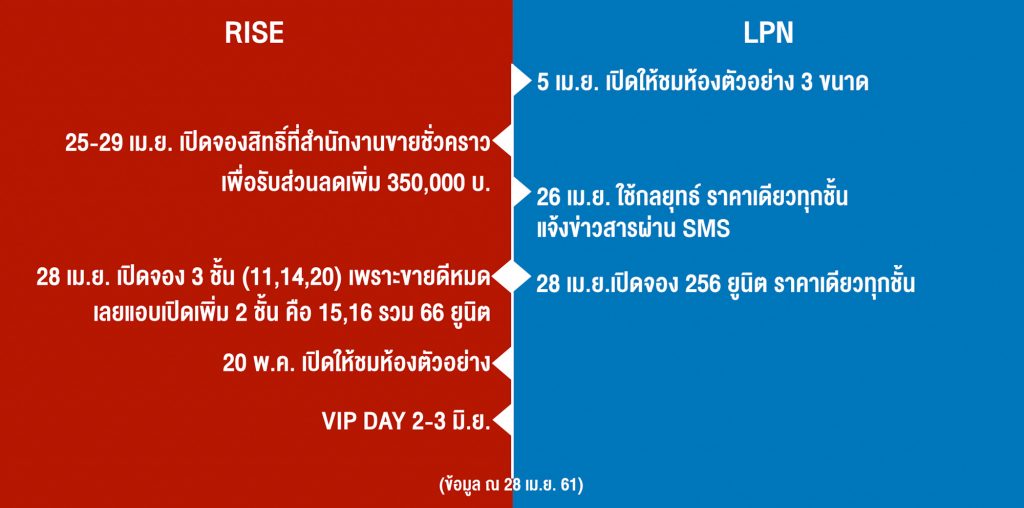 หากมีอัพเดท ทีมนักสืบอสังหา จะไม่พลาดรายงานความเคลื่อนไหวแน่นอน ฝากติดตามด้วยครับ
หากมีอัพเดท ทีมนักสืบอสังหา จะไม่พลาดรายงานความเคลื่อนไหวแน่นอน ฝากติดตามด้วยครับ
Facebook : www.facebook.com/SpyEstates
Website : www.spyestates.com


Philosophy is the discipline that studies major and universal questions, including existence, cognition, values, reason, and language. It encompasses a vast number of subjects and problems, ranging from ethics and political figures to metaphysics and logic. Here are the main nuances of philosophy:
1. Definition of Philosophy
Philosophy comes from the Greek words “philos” (love) and “sophia” (wisdom). It is the desire to realize and make sense of the world around us and our place in it.
2. The Main branches of philosophy
– Ontology research of the essence of being and existence.
– Epistemology the study of the nature and limits of cognition.
– Ethics the analysis of ethical principles and concepts of good deed and evil.
– Logic the study of the forms and principles of correct thinking.
– Political philosophy the study of questions of power, justice and the state.
3. Famous Philosophers
In the course of the history of philosophy, almost many thinkers have made meaningful contributions to this science. Some of the most recognizable include:
– Socrates, considered the founder of Western philosophy.
– Plato, a pupil of Socrates, developed the doctrine of forms.
– Aristotle, the creator of logic and a large number of scientific fields.
– Immanuel Kant, known for his Marcel Proust critical philosophy and work on moral issues.
4. The Relevance of Philosophy in the Modern World
Philosophy remains relevant in the modern world since enables people to understand complex social and ethical issues, also develops critical thinking. It affects the legal system, politicians, and different fields of science.
5. Practical Applications of Philosophy
Philosophical ideas penetrate everyday life. Ethical reflection helps people do the correct thing in complex situations, and philosophical analysis contributes to better understanding of issues related to technology, art, and social justice.
Philosophy is not only an academic discipline, yes and a way of thinking that helps us to understand life’s complexities and make informed choices.
Philosophy is the discipline that studies fundamental and universal questions, such as existence, cognition, values, mind, and language. It encompasses a vast number of topics and problems, ranging from ethics and political figures to metaphysics and logic. Here are the main nuances of philosophy:
1. Definition of Philosophy
Philosophy comes from the Greek words “philos” (love) and “sophia” (wisdom). It is the desire to understand and make sense of the world around us and our place in it.
2. The Main branches of philosophy
– Ontology the study of the essence of being and existence.
– Epistemology the study of the nature and limits of cognition.
– Ethics the analysis of ethical principles and concepts of good deed and evil.
– Logic research of the forms and principles of correct thinking.
– Socio-political philosophy the study of questions of power, justice and the state.
3. Famous Philosophers
In the course of the history of philosophy, many thinkers have made significant contributions to this science. Some of the most famous include:
– Socrates, considered the founder of Western philosophy.
– Plato, a student of Socrates, developed the doctrine of forms.
– Aristotle, the creator of logic and a large number of scientific fields.
– Immanuel Kant, known for his own Scott Fitzgerald critical philosophy and work on moral issues.
4. The Relevance of Philosophy in the Modern World
Philosophy remains relevant in the modern world as enables people to understand difficult social and moral issues, but also develops critical thinking. It affects the legal system, politicians, and various fields of science.
5. Practical Applications of Philosophy
Philosophical ideas penetrate everyday life. Ethical reflection helps people do the correct thing in complex situations, and philosophical analysis contributes to better understanding of problems related to technology, art, and social justice.
Philosophy is not only an academic discipline, but also a way of thinking that helps us to understand life’s complexities and make informed choices.
Philosophy is the discipline that studies fundamental and universal questions, including existence, knowledge, values, mind, and language. It encompasses a vast number of topics and problems, from ethics and political figures to metaphysics and logic. Here are the main nuances of philosophy:
1. Definition of Philosophy
Philosophy comes from the Greek words “philos” (love) and “sophia” (wisdom). It is the desire to understand and make sense of the world around us and our place in it.
2. The Main branches of philosophy
– Ontology research of the essence of being and existence.
– Epistemology the study of the nature and limits of knowledge.
– Ethics the analysis of ethical principles and concepts of good deed and evil.
– Logic research of the forms and principles of correct thinking.
– Political philosophy the study of questions of power, justice and the state.
3. Eminent Philosophers
Throughout the history of philosophy, many thinkers have made significant contributions to this science. Some of the most recognizable include:
– Socrates, considered the progenitor of Western philosophy.
– Plato, a pupil of Socrates, developed the doctrine of forms.
– Aristotle, the creator of logic and many of scientific fields.
– Immanuel Kant, known for his Philosophy critical philosophy and work on moral issues.
4. The Relevance of Philosophy in the Modern World
Philosophy remains urgent in the modern world as it helps people to understand complex social and ethical issues, but also develops critical thinking. It influences the legal system, politicians, and different fields of science.
5. Practical Applications of Philosophy
Philosophical ideas enter everyday life. Ethical reflection helps people do the correct thing in difficult situations, and philosophical analysis contributes to better understanding of problems related to technology, art, and social justice.
Philosophy is not only an academic discipline, but also a way of thinking that helps us to understand life’s complexities and make informed choices.